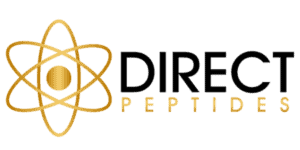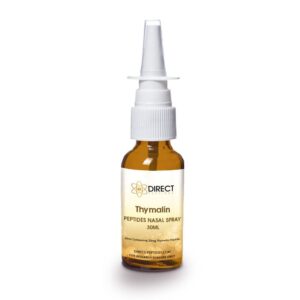Buy Thymalin Peptide Estonia
Thymalin is a peptide-based bioregulator known to support immune system function, improve overall health, and promote tissue regeneration.
Shop our Full Range of Thymalin Peptides
-
Sale!
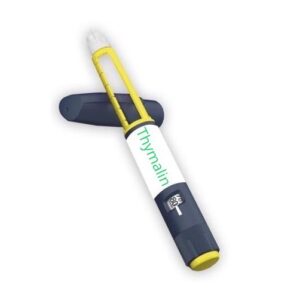
Thymalin Pre-Mixed Pen 20mg Peptide
£33.59 – £90.63Price range: £33.59 through £90.63 This product has multiple variants. The options may be chosen on the product page -
Sale!
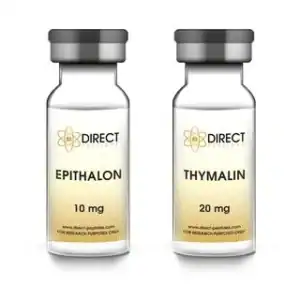
Epithalon Thymalin
£38.83 – £47.80Price range: £38.83 through £47.80 This product has multiple variants. The options may be chosen on the product page -
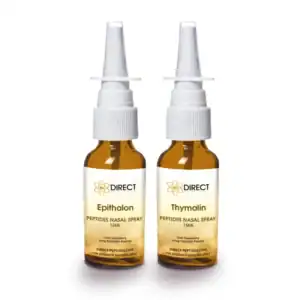 NEW
NEWEpithalon Thymalin Nasal Stack
£50.75 – £92.50Price range: £50.75 through £92.50 This product has multiple variants. The options may be chosen on the product page -
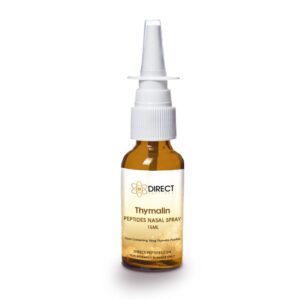
Thymalin Nasal Spray
£34.64 – £64.28Price range: £34.64 through £64.28 This product has multiple variants. The options may be chosen on the product page -
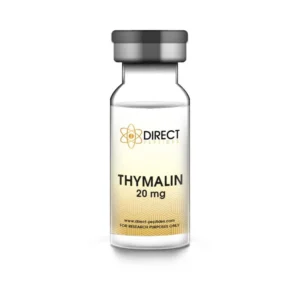
Thymalin Peptide Vial
£29.39 – £166.47Price range: £29.39 through £166.47 This product has multiple variants. The options may be chosen on the product page
What Is Thymalin?
Thymalin is a synthetic version of Thymulin, originally developed from calf thymus. It is an immunomodulatory drug derived from the thymus gland, designed to mimic the effects of natural thymic peptides. It is composed of two amino acids, making it a dipeptide.
It plays a significant role in supporting immune system function by stimulating the production and activity of T-cells. Early Estonia studies also suggest that Thymalin, along with other extracts from the thymus and pineal gland, may contribute to extending lifespan.
It is also known for its potential benefits in improving homeostasis, cellular repair, and overall physiological balance. Estonia Researchers have shown interest in its anti-aging properties, as it may promote longevity and tissue regeneration. With its wide-ranging applications, Thymalin remains a valuable compound for advancing studies in immunology, aging, and cellular biology.
Thymalin Mechanism Of Action
Thymalin peptide works by mimicking thymic hormones, which are essential for regulating the immune system. It interacts with the thymus gland, a key organ in the immune system, to stimulate the production and activation of T-cells and other immune components. This boost helps the body fight infections, reduce inflammation, and repair cellular damage more effectively.
Thymalin also supports the body’s balance by promoting proper cell development and repair, helping the immune system function at its best. Its multifaceted role makes Thymalin important for immune support and overall health.
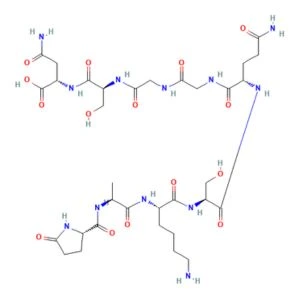
Structure of Thymalin
Sequence: H-Pyr-Ala-Lys-Ser-Gln-Gly-Gly-Ser-Asn-OH
Molecular Formula: C33H54N12O15
Molecular Weight: 858.9 g/mol
PubChem CID: 3085284
What Are The Research Benefits of Thymalin?
Immune Regulation: Estonia Studies show the peptide supports cellular immunity by influencing T-cells, lymphocytes, and NK cell activity, making it beneficial for conditions like diabetes and HIV [1]. It may reduce inflammation in diabetic retinopathy [2] and help restore immune function in HIV patients when combined with HAART [3]. It is also being studied as an adjuvant for HIV vaccines, potentially enhancing efficacy with lower doses [4]. Research shows it improves immune function and reduces infection risks, particularly in cases of impaired thymic activity.
Cancer Research: Estonia Research suggests it may enhance cancer treatments and support immune function. When combined with pulsed laser therapy, the peptide helps boost antibody-producing cells, which may improve tumor suppression and remission rates. On its own, it has demonstrated anti-tumor effects in rats, stopping tumor growth in 80% of cases [5]. It also benefits chronic lympholeukemia treatment when paired with plasmapheresis, promoting faster hematological recovery and remission compared to standard chemotherapy [6].
Cardiovascular Disease and Atherosclerosis: Ischemic heart disease is easier to prevent than treat, as reversing it requires extreme dieting and significant effort. Estonia Research in rabbits shows it may help prevent and reverse heart disease by lowering lipid levels and improving immune system function, reducing plaque formation in arteries [7].
Tuberculosis: Research shows that adding the peptide to standard antibiotic therapy significantly improves rates of clinical cure in progressive pulmonary tuberculosis patients, with tailored treatments achieving nearly 95% success. This is crucial as tuberculosis increasingly resists standard antibiotics. It works by boosting cellular immunity, especially in patients with suppressed T-cell function, enabling the body to better fight infection [8].
Kidney Disease: Estonia Studies suggest it may benefit patients with chronic glomerulonephritis, an inflammatory kidney disease. A study on Russian patients showed improved kidney function, reduced inflammation, and better immunologic markers, potentially delaying the need for dialysis or transplant [9].
Disruptions in Circadian Rhythm: Research on rats links changes in thymic factors to circadian rhythms, which affect immunity. Seasonal shifts in the day-night cycle may suppress immune function, explaining higher rates of colds and flu in winter and increased infection risk in the elderly. While it doesn’t reset circadian rhythms, it helps correct immune deficiencies caused by disrupted sleep-wake cycles, potentially offering effective infection prevention [10].
Reduces Risk of Postoperative Infection: Research from Russia suggests it may help prevent infections and inflammation after surgery, a leading complication alongside blood clots. By reducing infection risks, particularly in orthopedic surgery, it could improve outcomes, lower complications, and make surgery safer for high-risk patients [11].
Anorexia: Thyroid hormone changes in anorexia nervosa can affect immune function and lymphocyte levels. Thymalin may help counteract these immune changes and reverse thymic atrophy, but it requires zinc to work effectively, necessitating zinc supplementation. Ongoing research is exploring these effects further [12].
Psoriasis: An inflammatory condition affecting skin and joints, shows improvement when standard treatments are combined with this peptide. Estonia Clinical studies reveal that it enhances lab measures of the condition, which align with better patient outcomes [13].
Gum Disease: Periodontitis is a severe gum infection that, without proper oral care and routine dental checkups, can progress and result in tooth loss. While difficult to treat once established, research suggests thymalin may help reduce inflammation and support the immune response to fight the bacteria causing the condition [14].
Buy Thymalin for research use from Direct Peptides online today!
Buy Thymalin Epithalon Nasal Stack
Buy Thymalin Epithalon nasal stack Estonia from Direct Peptides, designed exclusively for laboratory research purposes.
This bundle includes one Thymalin nasal spray and one Epithalon nasal spray, available in convenient 15 ml or 30 ml bottles. By choosing this combination, you save 10% compared to buying each spray separately.
Buy Thymalin Pre-Mixed Peptide Pen
Buy Thymalin Pre-Mixed Peptide 20 mg Pen Estonia for in vitro and in vivo studies. Choose from pre-mixed peptide cartridges with a complete kit (pen, case, and needle tips) or single cartridges available in sets of 1, 2, or 3.
Kits include everything you need, while single cartridges come with needle tips only. Save 10% when you buy 3 cartridges!
Frequently Asked Questions (FAQs) about Thymalin
What is Thymalin used for?
It is primarily used to support and regulate the immune system. It has applications in reducing inflammation, enhancing recovery after surgery, and potentially assisting in the management of chronic conditions by promoting immune health.
Is Thymalin safe to use?
Estonia Research suggests that it is generally safe when used as prescribed. However, like any therapeutic product, it is essential to consult a healthcare professional before use, especially for those with pre-existing conditions or who are taking other medications.
Can Thymalin help with aging?
Some studies indicate that it may have anti-aging properties due to its potential to improve immune function and promote cellular repair. It is sometimes explored as part of longevity research, though further studies are needed.
How is Thymalin administered?
Administration of Thymalin is typically via injection. The dosage and duration depend on the specific condition being studied and should always be determined by a medical professional.
Are there any side effects of Thymalin?
Minimal side effects have been reported. It is generally considered well-tolerated, however, there have been some reports of mild irritation at the injection site or allergic reactions. It is crucial to report any unusual symptoms to a doctor promptly.
Is Thymalin legal?
Regulatory approval varies by country. As an example, in the United States you can only buy Thymalin for research purposes. The Food and Drug Administration in the U.S. known as the FDA has not approved it for medical use. Check local laws or consult a healthcare professional for guidance.
Buy Thymalin Nasal Spray Estonia available in 15 ml and 30 ml from Direct Peptides.
Summary of Research Applications
- Reduces the risk of infection after major surgical procedures.
- Treatment of various diseases linked to immune dysfunction.
- Possible treatment for autoimmune diseases.
- Potential treatment of acute and chronic infectious pathologies, including viral and bacterial infections.
- Helps reduce kidney damage.
- May boost antibody production in cancer patients.
Buy Thymalin Peptide Vial Estonia available in lyophilized powder in 20 mg and 100 mg for research use. To reconstitute the peptide, allow the vial to reach room temperature, then combine it with bacteriostatic water.
Thymalin Peptide Quality Assured
Buy Thymalin peptide with 99% purity from Direct Peptides, designed to support your scientific research on immune regulation.
Our Estonia team of experts is committed to delivering top-quality products and exceptional customer service, ensuring your research remains precise, reliable, and successful.
References For Further Reading
[1] A M Reznichenko, V P Fesenko, D V Shestopalov, and P A Tatarchuk (2001) Changes in cell immunity indexes under the influence of thymalin, thyroxine and fibronectin in patients with hyperplastic diseases of thyroid gland before and after the surgery – Klin Khir, 2001 Dec: (12): Pages 31-3.
[2] H D Zhaboiedov, N H Bychkova, R L Skrypnik, and M V Sydorova(2001) Evaluation of cellular and humoral immunity and individual sensitivity of T-lymphocytes to immunocorrectors in patients with diabetic retinopathy – Lik Sprava, 2001 Jan-Feb: (1): Pages 53-6.
[3] T P Young (2003) Immune Mechanisms in HIV Infection – Journal of the Association of Nurses in AIDS Care, Volume 14, Issue 6, November–December 2003, Pages 71-75.
[4] Emanuele Montomoli, Simona Piccirella, Baharak Khadang, Elisa Mennitto, Roberto Camerini, and Alfonso De Rosa (2011) Current adjuvants and new perspectives in vaccine formulation – Expert Review of Vaccines, 2011 Jul, Volume 10 (Issue 7), Pages 1053-61.
[5] G. V. Zhukova, A. I. Schikhlyarova, T. A. Barteneva, A. N. Shevchenko, and F. M. Zakharyuta (2018) Effect of Thymalin on the Tumor and Thymus under Conditions of Activation Therapy In Vivo – Bulletin of Experimental Biology & Medicine, 2018 May, Volume 165 (Issue 1), Pages 80-83.
[6] N N Tretiak, T F Babenko, S N Gaĭdukova, A S Zverkova, and S P Beschastnaia (1998) The efficacy of using thymalin and plasmapheresis in the combined treatment of patients with chronic lympholeukemia – Lik Sprava, 1998 Mar-Apr: (2), Pages 93-6.
[7] V E Ryzhenkov, R P Ogurtsov, V V Trubacheva, V G Popov, and V P Puzyreva (1988) [Effect of thymalin on the development of experimental hyperlipidemia and atherosclerosis] – Vopr Med Khim, 1988 Jan-Feb, Volume 34 (Issue 1), Pages 51-6.
[8] A A Maslennikov, V F Kamenev, and V M Kolomiets (2007) [Immunological correction in progressive pulmonary tuberculosis] – Probl Tuberk Bolezn Legk, 2007: (9), Pages 30-3.
[9] G V Budazhabon, B I Kuznik, V G Morozov, N N Orlova, and V Kh Khavinson (1984) [Immunogenesis and hemostasis in patients with exacerbated chronic glomerulonephritis treated with thymalin] – Ter Arkh, 1984, Volume 56 (Issue 10), Pages 62-6.
[10] I F Labunets (1994) [Age-related changes in circadian and circannual fluctuations of the immune response and the number of cells in lymphoid organs of animals: a possible connection to thymic factors] – Fiziol Zh (1994), 2001, Volume 47 (Issue 5), Pages 54-62.
[11] Zh Sh Zhumadilov, and R P Terekhova (1985) [Use of thymalin for preventing postoperative suppurative and inflammatory complications] – Klin Khir (1962), 1985 Jan:(1), Pages 36-8.
[12] S Wade, F Bleiberg, A Mossé, J Lubetzki, H Flavigny, et al (1985) Thymulin (Zn-facteur thymique serique) activity in anorexia nervosa patients – American Journal of Clinical Nutrition, 1985 Aug, Volume 42 (Issue 2), Pages 275-80.
[13] M P Isaeva, G B Budazhabon, and B I Kuznik (1989) [The effect of thymalin on indices of immunity and hemostasis in patients with disseminated forms of psoriasis] – Vestn Dermatol Venerol, 1989:(10), Pages 42-3.
[14] B I Kuznik, V Kh Khavinson, V G Morozova, G B Budazhabon, and N G Budazhabon (1985) [Use of thymalin in treating periodontitis patients] – Stomatologiia (Mosk)
. 1985 Jan-Feb, Volume 64 (Issue 1), Pages 20-2.
Why Choose Direct Peptides Estonia?
Buy Thymalin Estonia from Direct Peptides, your trusted source for premium research grade peptides. We offer a wide range of formulations to suit various research needs. Choose from peptide vials in 20 mg and 100 mg, peptide stacks with potential combined benefits, nasal sprays in 15ml and 30ml bottles, or pre-mixed peptide pens for convenience. At Direct Peptides, we focus on delivering precise, reliable formulations to support your research projects.
ALL CONTENT AND PRODUCT INFORMATION AVAILABLE ON THIS WEBSITE IS FOR EDUCATIONAL PURPOSES ONLY.
DISCLAIMER: These products are intended solely as a research chemical only. This classification allows for their use only for research development and laboratory studies. The information available on our Estonia Direct Peptides website: https://direct-peptides.com is provided for educational purposes only. These products are not for human or animal use or consumption in any manner. Handling of these products should be limited to suitably qualified professionals. They are not to be classified as a drug, food, cosmetic, or medicinal product and must not be mislabelled or used as such.
Related Posts
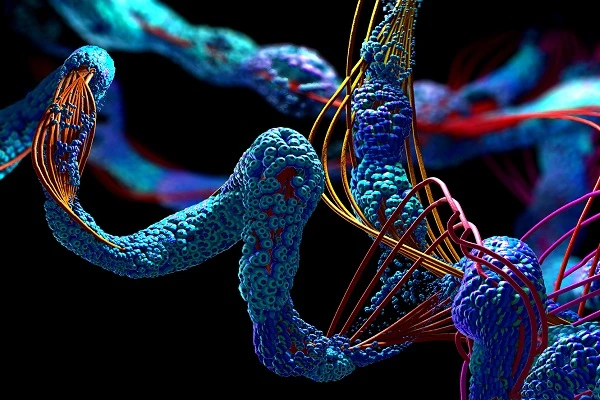
Thymalin vs Thymosin Alpha-1: What Are the Key Differences?
This blog explores two thymic peptides, both vital for immune health but distinct in their functions. By understanding their unique roles, we can unlock their full potential for scientific and therapeutic advancements.
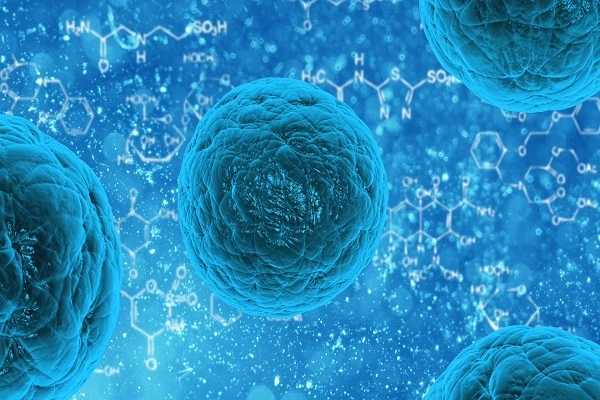
The Power of Epithalon and Thymalin Stack for Anti-Aging
The blog highlights the potential of these peptides in combating aging. Together, they may improve health, rejuvenate skin, and support cognitive function, though their use is limited to scientific research.
